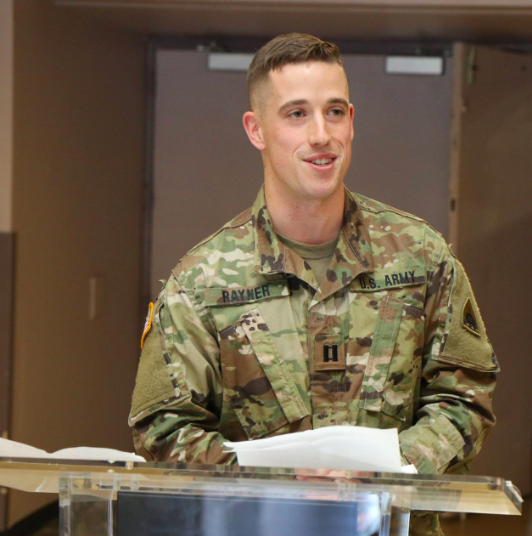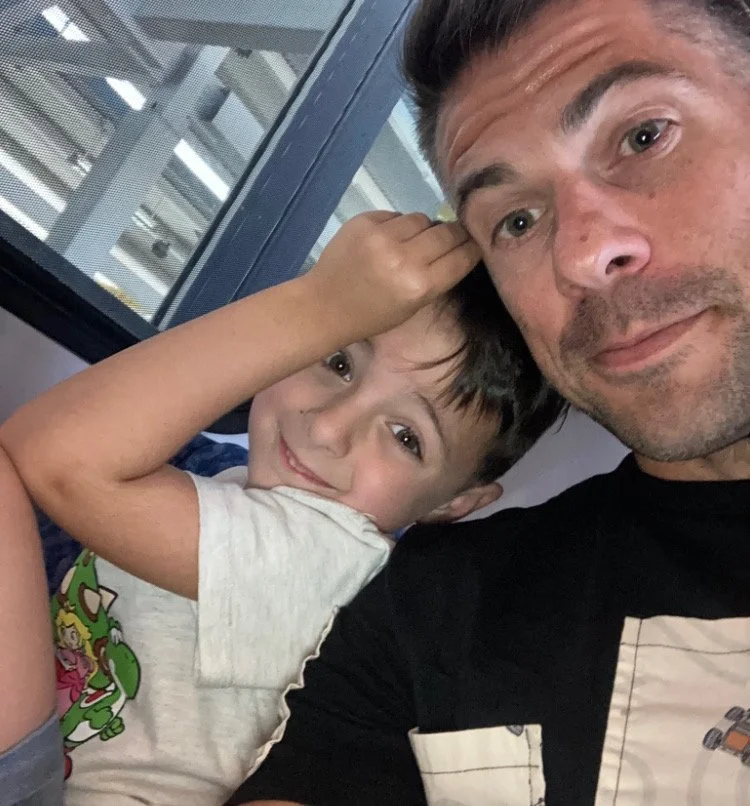Athlete Interview: Kenny Rayner and Coach Paul Duncan
I got a chance to do a little written interview my friend and National Guard Marathon Team mate, Kenny Rayner. He serves as a Captain in the California National Guard, and is the All Guard marathon team’s top runner, winning overall this year at the All Guard Team Trials, in Omaha.
Questions below!
If you haven’t gotten a chance, check out Kenny’s appearance on my food review channel during a National Guard Marathon event in Idaho.
Q: Hey! Thanks for taking the time to share a little bit about your running journey with us! Can you start out by just telling us a little bit about yourself? Maybe a little about your running history? How long have you been a runner for? What's your background in the sport? How'd you get involved?
A: During the last ten years, I have somehow pieced together some quality races without having natural ability or a lengthy childhood running career. My fire and passion for the sport began during my Junior year of High School with one season of indoor track. I had been one of the last cuts from the baseball team every year from 7th grade to 11th grade and needed to try something new. I showed up to practice to join the sprint squad and spent most of the season running hills and hitting the gym.
I sucked. I raced junior varsity sprint events, achieving slow times and clearly not having what it took to be a powerful sprinter. On a dare from a slightly overweight rugby player, I was challenged to a 1 mile indoor track race. I bested the rugby player with a sad 5:52 mile that left me on the verge of passing out at the finish line. The following year, I was determined to best my mile time and make a serious effort at distance running after jogging around town over the summer. My first race of indoor junior varsity track was a 5:10 in street shoes, a significant drop in time from the past year.
From there I just took the attitude of always being the hardest worker at the track, no one can ask more of you than that. I finished High School with a 4:47 mile time and had serious ambitions to run track in college. I received the most improved runner award for both indoor and outdoor track during my senior year of High School. Frustratingly, I ended up with mono during my freshman year at Bryant University - the week before track tryouts. This was a huge blow as I ran a 4:35 or so time trial, needing a sub 4:15 1500m to make the D1 varsity track team. I trained hard over the summer to try out for the cross country team at Bryant University, after never having ran cross country in high school. I needed a sub 17:00 5k over the summer in a certified road race to make the team.
WIth serious determination, I ran a 16:59 at a mom & pop 5k on the Charles River in Boston to secure my spot on the varsity cross country team. In college, my performance was not worthy of interviews or newspaper articles. I was terrible. I started off as a terrible runner in college, just trying to stay on the team. Other runners on the team initially hated me because I would hammer every single workout and never let anyone have an easy day. It wasn't until my senior year where the work paid off and I ran a 4:26 mile and a 15:36 5K. I didn't quit, just kept grinding away and always being the guy to give it all on the track at each practice. 1 week after graduating college, I ran my first marathon at the 2012 Vermont City Marathon in 2:42:50. At that point I was hooked, I knew marathoning would be my thing, this would become the greatest pursuit of my life. (This is a very long response, cut out what you see fit). In 2019, I ran a 2:22:31 at the Chicago Marathon, a 5:27 per mile average for 26.2 miles. In 2007, I could run 1 mile faster than 5:52. Never quit, and keep fighting during every track workout. Enjoy each personal best as they happen, but do everything you can to keep setting personal bests, there is no greater feeling in the world.
Q: With your crazy marathon run times, it would appear this is your full time job, but I know you have a full time job. Tell us a little but about your balance with running and work and other obligations? How do you fit it all in?
A: 24 hours in a day, how do you want to manage the time? There are very few things that you need to do in life, you do things because you want to do them. Sometimes you have to get creative. I started running to and from the office during my big training cycles of 120-140 miles. I wanted to get the training in, so I found a way. I have significant travel for my civilian law enforcement job and often have to find ways to train "on the road". That means going for a solo 20 mile run from a hotel located in an unfamiliar city at 10pm at night. If you want it bad enough, you will make it happen. Get creative and don't fall for conventional training times, conventional workout places or having to run in a group workout setting. If your only option is laps around the hotel, then you knock out laps around the hotel. I once traveled to a small city in West Virginia, staying at a hotel surrounded by highways, and didn't have a rental car. I ran 10 miles in a circle around the hotel. I'm sure there are many runners in the MIlitary who have had to find creative ways to incorporate long runs on deployment.
Q: Can you give us a little overview of your weekly running schedule? Do you follow a specific regimen? Is it flexible? On average, what would you say your weekly mileage looks like?
A: I may be flexible on how or where I completed my workouts, but I always try to keep the 7 day training plan the same of Monday intervals, Thursday tempos and Saturday long runs. During a goal marathon race buildup, I aim for 100-120 miles per week with morning/evening run-commute miles (running vest). My plan for next year's goal marathon is 120-140 mile weeks of mileage, similar to the grind it out style of runners from the 1970s/80s.
Q: As an endurance coach, one of the biggest principles I preach is regarding pre-race and race day fueling. Do you feel this is an important element in racing and training? How do you approach your pre-race meals, and fueling during the race? Do you use any specific products?
A: My pre-race meals are very simple. My stomach cannot take any complex foods so I end up with some type of granola or two packs of brown cinnamon sugar pop tarts before a marathon. They are high in calories and easy on the stomach. There are most definitely better options, but granola and pop tarts work for me, so I'm not gonna alter that plan
Additional Questions from people on Facebook:
Q: What is your number one piece of advice for improvement in a new runner.
A: Set goals and stick to them. If you plan on running 30 miles for the week, do it, no excuses. You can easily find yourself giving up a run and saying that you can make the mileage up later in the week. Chances are you wont make up those miles and you wont hit your goal. Secondly, out and back runs, these are crucial for new runners. If you run 2 miles out, you have to run 2 miles back and won't cut the run short.
Q: What advice do you have for a young athlete trying to get fast at the 5k-10k distance?
A: Intervals. You have to get comfortable running at your goal race pace and then faster than goal race pace. Intervals allow you to hit those paces and get a feel for pace. I found the best 5k interval workout to be 5 by 1000m at goal race pace with a 400m jog between reps. If you hit your goal 5k pace in the intervals then you're ready to run the time on race day. 10ks are a different animal - think 3 by 2 mile intervals with 400-800m recovery jogs between reps or mile repeats.
Q: Do you believe winning is everything? Or is there a bigger picture?
A: Winning in running is a bonus, not the ultimate or secondary goal. I have always believed in the pursuit of personal bests for yourself and your training partners. If you run a PR then you are the best version of yourself at that point in time. How can there be a better feeling than that? A win has too many variables, did the right competition show up? Did the competition have a bad day? Does the course not play to your strengths?
Q: Are you more of a 5 pocket or a 7 pocket type of guy? #shotgunpocketshirt
(if you need clarification on the #shotgunpocketshirt, see video above)
A: 9 pockets for balance and optimization.
Q: Where can people find out more about you?
A: Kenny Rayner on Strava, @kennyrayner on the instagram or Kenny Rayner on facebook. I post a lot of race results on social media. A lot of people think it is cool to stay off social media. Maybe it is cool, but in this sport, you need any form of motivation you can get. What is more motivating than seeing other runners hit personal bests? You see those times drop, and you're going to want that same feeling.
Thanks Kenny! We all appreciate your time :-) See you at the next race!
ABOUT THE AUTHOR:
Paul Duncan is a full time military recruiter, USAT Certified Coach, QT2 Systems Level 1 Coach, and OutRival Racing Level 3 coach. For coaching inquires, click HERE.
Paul also competes in triathlon and running events in his spare time.
70.3 PR (4:24:26)
140.6 PR – (9:51:53)
Half Marathon – (1:24:21)
Marathon – (2:57:27)
Follow me on INSTAGRAM @paulduncanjr














